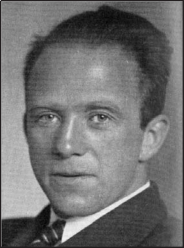- HEISENBERG
- GERMANY (see also List of Individuals)\
 5.12.1901 Würzburg/D - 1.2.1976 München/D\Werner Heisenberg initiated studies in theoretical physics in 1920 at Munich Technical University where Arnold Sommerfeld (1868-1951) was his main teacher. He submitted a habilitation thesis in 1924 to the University of Göttingen and then joined Born, then a professor at Copenhagen University. The two elaborated the theory of quanta which was awarded with the Nobel Prize in 1932. In 1927, Heisenberg was appointed professor of theoretical physics at Leipzig University and took over the same chair in 1937 at Munich Technical University, once Sommerfeld had retired. After World War II he directed the Max-Planck-Institut in Göttingen first, and from 1956 stayed in Munich.\Heisenberg was one of the outstanding physicists of the 20th century, with essential contributions to atomic physics. During his stay with Sommerfeld in the 1920s, he also worked in fluid mechanics. His PhD thesis was a work in turbulence, reconsidered in 1947 following the findings of Andrei Nikolaevich Kolmogorov (1903-1987). Whereas the research of the two was mainly a theoretical approach to certain statistical features of turbulent flows, their findings were compared only later with selected observations, once the required instrumentation was available.\Anonymous (1933). Prof. Dr. Werner Heisenberg. Umschau 37(50): 986. PGroot, S.R. de (1975). Werner Heisenberg. Jaarboek Koninklijke Nederlandsche Akademie van Wetenschappen: 210-212.Heisenberg, W. (1922). Die absoluten Dimensionen der Karman'schen Wirbelbewegung. Physikalische Zeitschrift 23: 363-366.Heisenberg, W. (1924). Das Problem der Turbulenz. Dissertation. Universität: Göttingen. Heisenberg, W. (1924). Über Stabilität und Turbulenz von Flüssigkeitsströmen. Annalen der Physik Serie 4 74: 577-627.Heisenberg, W. (1947). Zur statistischen Theorie der Turbulenz. Zeitschrift für Physik 124: 628- 657.Radicati, L.A. di Brozolo (1977). Werner Heisenberg. Celebrazioni Lincee 108. Accademia Nazionale dei Lincei: Roma. P http://www.chemie.uni-bremen.de/stohrer/biograph/heisen.htm P http://www-gap.dcs.st-and.ac.uk/%7Ehistory/Mathematicians/Heisenberg.html http://www-gap.dcs.st-and.ac.uk/HEISENBERGhistory/Mathematicians/Heisenberg.html P
5.12.1901 Würzburg/D - 1.2.1976 München/D\Werner Heisenberg initiated studies in theoretical physics in 1920 at Munich Technical University where Arnold Sommerfeld (1868-1951) was his main teacher. He submitted a habilitation thesis in 1924 to the University of Göttingen and then joined Born, then a professor at Copenhagen University. The two elaborated the theory of quanta which was awarded with the Nobel Prize in 1932. In 1927, Heisenberg was appointed professor of theoretical physics at Leipzig University and took over the same chair in 1937 at Munich Technical University, once Sommerfeld had retired. After World War II he directed the Max-Planck-Institut in Göttingen first, and from 1956 stayed in Munich.\Heisenberg was one of the outstanding physicists of the 20th century, with essential contributions to atomic physics. During his stay with Sommerfeld in the 1920s, he also worked in fluid mechanics. His PhD thesis was a work in turbulence, reconsidered in 1947 following the findings of Andrei Nikolaevich Kolmogorov (1903-1987). Whereas the research of the two was mainly a theoretical approach to certain statistical features of turbulent flows, their findings were compared only later with selected observations, once the required instrumentation was available.\Anonymous (1933). Prof. Dr. Werner Heisenberg. Umschau 37(50): 986. PGroot, S.R. de (1975). Werner Heisenberg. Jaarboek Koninklijke Nederlandsche Akademie van Wetenschappen: 210-212.Heisenberg, W. (1922). Die absoluten Dimensionen der Karman'schen Wirbelbewegung. Physikalische Zeitschrift 23: 363-366.Heisenberg, W. (1924). Das Problem der Turbulenz. Dissertation. Universität: Göttingen. Heisenberg, W. (1924). Über Stabilität und Turbulenz von Flüssigkeitsströmen. Annalen der Physik Serie 4 74: 577-627.Heisenberg, W. (1947). Zur statistischen Theorie der Turbulenz. Zeitschrift für Physik 124: 628- 657.Radicati, L.A. di Brozolo (1977). Werner Heisenberg. Celebrazioni Lincee 108. Accademia Nazionale dei Lincei: Roma. P http://www.chemie.uni-bremen.de/stohrer/biograph/heisen.htm P http://www-gap.dcs.st-and.ac.uk/%7Ehistory/Mathematicians/Heisenberg.html http://www-gap.dcs.st-and.ac.uk/HEISENBERGhistory/Mathematicians/Heisenberg.html P
Hydraulicians in Europe 1800-2000 . 2013.
